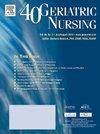基于群体轨迹建模(GBTM)的主观幸福感轨迹影响因素:马鞍山健康老龄化队列研究结果。
IF 2.5
3区 医学
Q3 GERIATRICS & GERONTOLOGY
引用次数: 0
摘要
目的:本研究旨在探讨主观幸福感(SWB)的轨迹和预测因素:方法:对马鞍山市的老年人进行为期 5 年的跟踪调查。采用纽芬兰纪念大学幸福量表(MUNSH)测量主观幸福感。结果:2495 名年龄≥60 岁的成年人完成了调查。结果:2495 名年龄≥60 岁的成年人完成了调查,并确定了四种 SWB 轨迹:低分上升组[130(5.2%)]、高分下降组[316(14.7%)]、高分稳定组[1827(73.2%)]、中分波动组[172(6.9%)]。以高分稳定组为参照,社会支持、抑郁症状和自我健康报告是所有组别预测 SWB 的因素:结论:老年人的 SWB 有不同的发展轨迹。结论:老年人的 SWB 有不同的发展轨迹,护理人员可从社会支持、减少抑郁和改善身体健康等方面对老年人的 SWB 进行干预。本文章由计算机程序翻译,如有差异,请以英文原文为准。
Influencing factors of subjective well-being trajectory based on the group-based trajectory modeling (GBTM): Results from a healthy aging cohort study in Ma'anshan
Aim
This study aimed to explore the trajectory and predictors of subjective well-being (SWB).
Methods
Elderly in Ma'anshan were followed up for 5 years. SWB was measured using the Memorial University of Newfoundland Scale of Happiness (MUNSH). GBTM was used to group the trajectories of SWB, and multivariate logistic regression was used to explore the influencing factors of the different trajectories.
Results
2495 adults aged ≥60 years completed the survey. Four SWB trajectories were identified: low score ascending group [130(5.2 %)], high score decline group [316(14.7 %)], high score stable group [1827(73.2 %)], moderate score fluctuation group [172(6.9 %)]. With the high score stable group as the reference, social support, depressive symptoms and self-reported health were predictors of SWB for all the groups.
Conclusions
The SWB of the elderly has different developmental trajectories. Nursing staff may be carry out intervention on SWB of the elderly from social support, reducing depression and improving physical health.
求助全文
通过发布文献求助,成功后即可免费获取论文全文。
去求助
来源期刊

Geriatric Nursing
医学-护理
CiteScore
3.80
自引率
7.40%
发文量
257
审稿时长
>12 weeks
期刊介绍:
Geriatric Nursing is a comprehensive source for clinical information and management advice relating to the care of older adults. The journal''s peer-reviewed articles report the latest developments in the management of acute and chronic disorders and provide practical advice on care of older adults across the long term continuum. Geriatric Nursing addresses current issues related to drugs, advance directives, staff development and management, legal issues, client and caregiver education, infection control, and other topics. The journal is written specifically for nurses and nurse practitioners who work with older adults in any care setting.
 求助内容:
求助内容: 应助结果提醒方式:
应助结果提醒方式:


